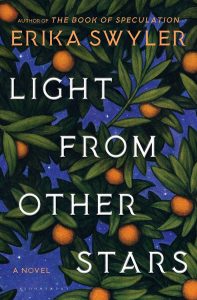 Published by Bloomsbury 7 May 2019
Published by Bloomsbury 7 May 2019
320pp, hardback, $27
Reviewed by Elsbeth Lindner
If father/daughter bonds don’t constitute one of the five plot paradigms of all time, they surely should. From Shakespeare to Dickens, Wagner to Verdi, those powerful stories of connection and separation, of adult judgement shifting from parent to child, reliably twang heartstrings. And Swyler’s new novel draws its power from the same energy source.
It’s a tale of science – of time and travel and matter – but it’s also a science-fiction adventure story, and a pretty gripping one, in which the heroes/scientists/survivors are principally the women. If fathers matter intensely, mothers do just as much.
Nedda Papas, eleven years old and a science nerd, has grown up in a small Florida community called Easter, the child of a not-so-happy marriage that has faltered as a result of grief and secrecy. Her father Theo is a scientist, and so is her mother Betheen, but Betheen has turned to baking (which is also, essentially, a series of chemistry experiments) in recent years. Nedda’s father has been experimenting with entropy via a machine called Crucible, and on the day of the Challenger space disaster, close to Easter, Crucible finally springs to life, exerting an influence over Easter generally, and certain individuals in particular, that will break hearts and propel some of the characters far into the future.
This 1986 timeline is spliced with another which traces adult Nedda and three other travelers aboard a spacecraft called Chula, headed on a one-way mission to colonize a distant planet. This storyline contains its own threads of drama and love, but the dominant story is the one set on earth, where Betheen and Nedda race to save Easter, a crucial act which can only come at the price of unbearable sacrifice.
Swyler connects these elements, and others too, notably the pain of losing a child, rather like Betheen and Nedda constructing their salvation machine out of many pieces of old but freshly purposed equipment – with fluid readability and a powerful emotional drive. The science is delivered plausibly and persuasively. And Nedda’s personality, fused from her parents’ love and skills, their mistakes and her own individual nature, is charming both as adult and child.
For all its modernity – the ideas, the science, the female leads – this is, at heart, an old-fashioned romance of a story, and that heart can sometimes appear a soft one. Father/daughter love binds it. As doting parents and clear-eyed but adoring children part but never wholly separate so Swyler sends out a message of loving reassurance into the universe.
